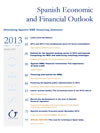Unlocking Spain’s SME financing channels
Fecha: 2013
Spanish and International Economic & Financial Outlook, SEFO, V. 2 N.º 1
Sumario
[expand title= "2012 and 2013: Two fundamental years for fiscal consolidation "]- The deterioration of Spain’s public accounts and investors’ loss of confidence are among the most visible effects of the economic crisis. Although there is disappointment at falling short of fiscal targets, consolidation efforts in 2012 have been significant and it is likely that the same will be true in 2013. Further acceleration of the adjustment rate, particularly if this involves additional tax increases, could seriously damage the productive fabric and the financial system, which will not help in restoring investor confidence. On the other hand, greater involvement of European institutions and additional structural reforms may not yield visible results in the short term, but will contribute to long-term sustainability of public accounts while helping to raise confidence levels.
- Leer más
- The implementation of the MoU requirements has shown significant progress since November 2012. Key steps such as the approval of the restructuring/resolution plans, the injection of the necessary capital for banks and the effective transfer of impaired assets from the banks to the asset management company Sareb, have been carried out. Importantly, these events have coincided with a relatively calmer situation in sovereign and private debt markets that has brought some stability to financial institutions. This can been seen in the increase in deposit inflows in November 2012, after observing a continuous outflow since March 2012.
However, loans continued decreasing. Adoption of important pending measures, such as initiation of activities of the asset management company Sareb and the completion of new bank restructuring plans, should also be addressed in 2013. The completion of the efficiency plans of the banks in 2013 may help create a better environment for lending, but the growth of bank financing will ultimately depend upon the improvement of macroeconomic conditions.
- Leer más
- According to the ECB survey on SMEs, access to finance has been an ever-increasing key challenge for European SMEs during the crisis, both in terms of quantity and conditions of available bank credit. European SMEs in general perceive that: i) banks are less willing to lend, ii) available credit terms and conditions have deteriorated; and, iii) the outlook regarding future availability of bank credit is worsening. In addition, the closure of wholesale markets to Spanish banks, their increased default rates, and financial institutions’ risk aversion is
exacerbating negative conditions, with low expectations on the part of Spanish SMEs that the situation will improve over the coming months.
- Leer más
- The drought in bank credit will not be short-lived, making it imperative for SMEs to tap alternative sources of financing, through either debt or equity markets. Debt financing options range from commercial paper or bond issuance, securitization of loans, or creation of investment funds to invest in SME debt. However, these SME debt-financing options would need to overcome investor risk perceptions, illiquidity, high costs to the issuer, and regulatory barriers. Equity finance could be channeled through the already existing Alternative Investment Market (MaB), which could potentially provide a lower cost equity option to SME issuers, among other benefits, such as brand image and diversification. For this to be the case, MaB’s existing shortcomings and current negative dynamics will have to be addressed over time.
- Leer más
- The financing of the public administration in 2012 presented a mixed picture. The state managed to successfully meet its funding needs without incurring higher costs than in previous years, partly due to a reduction in the average life of outstanding debt. Regional governments faced significant difficulties, thus forcing the state to set up extraordinary funding mechanisms that will, however, very likely end up becoming permanent for many regions, at least for as long as the present financial situation persists. Local authorities have made a substantial fiscal adjustment effort in 2012, which will allow them greater room for maneuver in funding for 2013. Nevertheless, any return to capital markets seems unlikely under present conditions.
- Leer más
- The creation of the temporary contract in 1984 has given rise to one of the most important problems of Spain’s labor market today - duality. Several recent reforms have tried to address this issue, including the latest in February 2012, however unsuccessfully. This reform aimed to shift workers’ and firms’ incentives away from external flexibility and towards internal flexibility. Unfortunately, initial evidence suggests that still high severance costs for unfair dismissal and legal uncertainty have led to firms’ continued preference for the temporary contract. The resulting buffer of temporary employees is reducing willingness of permanent workers to
accept internal flexibility and thereby hindering progress of the reform overall.
- Leer más
- As a result of recent reform efforts, Spain’s structural imbalances are adjusting, providing the country with a competitive, export-driven growth model. EU liquidity facilities will allow Spain to remain solvent at the sovereign and banking level. Under the efficient market hypothesis, Spain represents an opportunity for appealing risk adjusted investment returns–with asset prices for today’s Spain at minimum historic levels. However, investors are failing to take advantage of opportunities due to existing negative perceptions over the Spanish economy.
- Leer más

